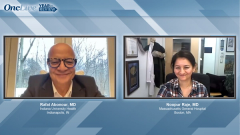
Understanding the Role of BCMA-Targeted CAR-T Therapies in R/R MM
Noopur Raje, MD discusses the rationale for utilizing BCMA-targeted CAR-T cell therapy in myeloma patients and uncover the similarities and differences when compared to BCMA bispecific.
Episodes in this series

This is a video synopsis/summary of an OncLive® Post-Conference Perspective involving Rafat Abonour, MD, and Noopur Raje, MD.
Raje explains the rationale for using B-cell maturation antigen (BCMA)–targeted chimeric antigen receptor (CAR) T-cell therapy for relapsed/refractory multiple myeloma. She notes that BCMA is expressed on nearly all plasma cells and very late B cells, and laboratory evidence suggests it is an important growth/survival factor for myeloma cells. Given its restricted expression, BCMA makes an ideal antigen target for T cell–redirected therapies.
Both BCMA-targeted CAR T-cell products, idecabtagene vicleucel and ciltacabtagene autoleucel, are now FDA approved for patients after at least 4 prior lines of therapy. Two BCMA-targeted bispecific T-cell engagers, teclistamab and elranatamab, are also now approved.
CAR T-cell therapy involves collecting a patient’s lymphocytes, genetically modifying them to express a CAR targeting BCMA, and reinfusing the cells. This personalized approach takes 4 to 6 weeks. In contrast, bispecifics are off-the-shelf antibodies with 2 arms: one targeting BCMA on tumor cells and one targeting CD3 on T cells to bring them in close proximity and trigger tumor cell killing. Both treatment modalities yield deep and durable responses.
Video synopsis is AI-generated and reviewed by OncLive® editorial staff.







































